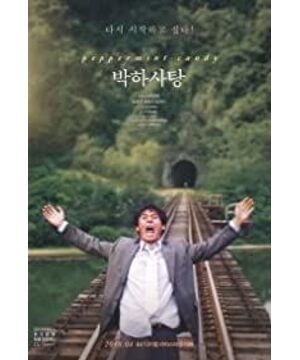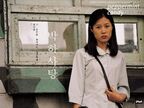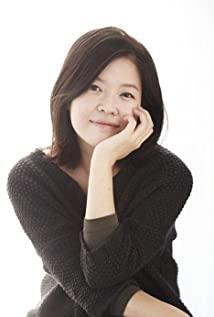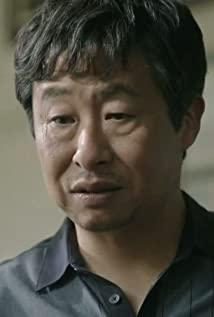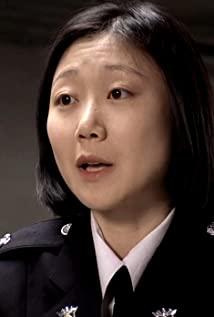2005. The word retrospective is always with a touch of sad poetry.
The train drives time on the endless tracks of life and travels backwards...A man's 20-year metamorphosis is reproduced here one by one.
Peppermint is the happiness that he will linger in his whole life. It is also his only happiness.
"In the spring of 1999, an outing"
he was a bankrupt businessman. He came to the class reunion 20 years later. He came to remember his youth. He sang and jumped madly, and finally climbed onto the rails on the bridge, and shouted desperately at the oncoming train: "I want to go back! I want to go back!"
A life doomed to be sad began.
"Photo taken three days ago in the spring of 1999." The
wife broke up, the company went bankrupt, the securities fell horribly, and friends turned their backs on. He held a glass jar full of mints in his hand and sobbed at the bed of his seriously ill first love. These candies were sent to him by her in a letter one by one when he was serving in the military. The Sri Lankan is already haggard and no longer remembers. He turned around and sold the camera left by his lover, sat on the stone bench and "swiped" and pulled out the negatives-forget it completely.
"In the summer of 1994, life was beautiful."
In the summer of 1994, his lover handed him a mint in the car.
Start a company, buy securities, move to a new house.
"Life is beautiful, isn't it?" The
person in front of him just kept bowing. Who to ask. What can I ask. The answer is long ago, but I still don't want to admit it, I don't want to say it. Didn't you see the helplessness and emptiness from the corner of your eye to the smile?
In the evening, who was standing downstairs in the unit of the new home and shouting desolately: "Shimin his dad! Shimin his dad!"
"Spring 1987, confession"
He was still a bad-tempered and famous policeman. He worked cruelly and abused the prisoners outrageously. He lives numbly, and his wife is indifferent to having children.
This year, in the patter of rain, he came to the hometown of his first love because of the case.
He smiled and said to the little prostitute: "I didn't come to find my first love. I just want to visit the place where she used to live. Walk the way she walked and see the sea she saw...Even if it's raining now, I want to get caught in the same rain as she is. "It's
really sensational. The little prostitute laughed hard. "Then you will treat me as her tonight, and tell what you are saying. Okay? Hurry up~"
"Say it!"
So the man was in the dark room, shaking and whispering over and over again Shouting: "Shunyi~Shunyi~"
"Ai~"
"Ai~" The
little prostitute also cried.
the next day. He wiped blood for the prisoner in the car. The lonely figure of the little prostitute lingered on the pier. Arrange to have breakfast together. But, after all, I still can't go back. When did it start?
"Autumn 1984, Prayer"
, the boy Leng who had just entered the police station from the factory. Secretly in love by the girl in the shop. Missed by his first love. He tried to learn from the old policemen to interrogate prisoners. Violent elements surged out of the body, frightening the prisoner to piss off his shit. Sinful hands are no longer the gentle hands in the eyes of lovers. He looked at his hands contemptuously, and touched other women with them in front of his lover.
Let's go back. Don't come to see me. I don’t need the camera anymore.
Because I have changed.
That night he shared the bed with the little shop girl. She grabbed a corner of the sheet and said reservedly: "Wait a minute, let's pray first."
"May 1980, meet" The
nightmare began this year. He went to perform military service. His first love deliberately visited him, but was told that visits were forbidden during extraordinary times. She didn't know, but they still met. On the car he was sent to suppress the Gwangju student movement, she was walking down the dusty road in frustration, amidst the roar of men, he was pleasantly surprised to see her.
Gentle gaze, full of happiness.
But this moment is too short.
His treasured mints were knocked over in the chaos before departure and trampled by pairs of army boots. The close-up tells us that this is a dangerous signal.
really.
night. He was shot in the foot by random guns, and he himself missed and killed an innocent girl. "Bang!" Life was haunted by nightmares ever since. Under the dim yellow light of the flashlight, there was a human face that was distorted because of distress and fear.
"In 1979, the picnic meeting"
he murmured to Shunyi: "It's weird~ I don't know why, although it is the first time to come here, but I have a very familiar and kind feeling." I am willing to believe that this is 20 years from now. He's back.
He finally came back, good at the beginning. He chose to end his life here 20 years later. Here are his dreams, his beloved woman, lovely wildflowers, bright sky and everything that belongs only to the young and pure.
In the close-up, his eyes gleaming while looking up at the sky.
a long time. A tear came from the corner of my eyes...
choosing such a complete flashback method, while showing a man's 20 years, at the same time looking back at a country's 20 years. First of all, as a writer, Li Cangdong used the unique humanistic care of intellectuals to reflect and think. In the past 20 years, South Korea has experienced economic start, suppression of democracy movement, totalitarian rule, economic take-off and financial turmoil. From a positive perspective, the transition from the military to the popular election of the president is indeed a kind of progress. But just like the song sung at the outing at the beginning and end of the film, men have regressed in these 20 years: "You used to be so gentle, why are you so indifferent now?" 20 years is not long. Almost anyone will experience these 20 years of life. Men’s tragedies are more individual tragedies. He does not represent the living conditions of that generation, but the question is, who can represent it? I think the director’s humanistic care is reflected in this: the individual is the society, and every individual cannot be ignored.
There is not too much technical stuff in this video. It's just a time backward, and it's also in the middle distance. The beginning of each section is accompanied by a picture of a slow railroad track and music. Then there are subtitles prompted by time. What I like is the quietly moving shots and simple switching in the film. It's like a dying person's replay of his entire life in the second before death-this second is stretched infinitely in the movie. In the memory, many details are magnified-at this time the composition in the lens is particularly rich, including far, middle, and near, static and dynamic scenes. There are still many facts in the memory that have been overlooked-at this time, the lens connection in the film is fast and natural switching, as if a person's thinking is always leaping forward. Whether the lens can convey emotion is also one of the criteria for judging the quality of a movie. The shots of this movie are very close to the overall tone, and there is a feeling of time passing when looking at those images. And once a person perceives the age of water, weakness and sadness will naturally invade. The film is relying on this calmness to slowly engage in infiltration activities. I like this method very much.
Lee Cangdong's name became famous overseas with "Oasis", and "Mint" first made him famous in China, with 500,000 viewers in South Korea. In an interview with a Chinese reporter, he said that this film is a personal investment and has no official support. It is not as popular and commercialized as "Common Security Area" and "Friends". At the box office, even he himself was surprised. He said: "My original intention was to give 20-year-old viewers the background of their lives. I shot them. I want to remind them to think about,'what does time mean'. Some young viewers even watched it twice. The effect is surprisingly good."
It seems to have just caught up with my RIGHT TIME.
View more about Peppermint Candy reviews


